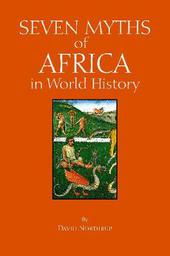
|
Seven Myths of Africa in World History
Paperback / softback
Main Details
| Title |
Seven Myths of Africa in World History
|
| Authors and Contributors |
By (author) David Northrup
|
| Physical Properties |
| Format:Paperback / softback | | Pages:192 | | Dimensions(mm): Height 229,Width 152 |
|
| Category/Genre | African history |
|---|
| ISBN/Barcode |
9781624666391
|
| Classifications | Dewey:960 |
|---|
| Audience | |
|---|
|
Publishing Details |
| Publisher |
Hackett Publishing Co, Inc
|
| Imprint |
Hackett Publishing Co, Inc
|
| Publication Date |
1 September 2017 |
| Publication Country |
United States
|
Description
"Northrup's highly accessible book breaks through the most common barriers that readers encounter in studying African history. Each chapter takes on a common myth about Africa and explains both the sources of the myth and the research that debunks it. These provocative chapters will promote lively discussions among readers while deepening their understanding of African and world history. The book is strengthened by its incorporation of actors and issues representing the African diaspora and African Americans in particular." -Rebecca Shumway, College of Charleston
Author Biography
David Northrup is Emeritus Professor of History, Boston College, and recipient of the 2017 World History Association's Pioneers in World History Award.
ReviewsA superb introduction to major themes in African history, lively and without jargon, and pitched at the right level for a general or student readership. At the same time, it does not oversimplify. Unlike many other introductions to African history, the text does not overwhelm with details, but focuses on arguments and issues with which readers can engage. Northrups approach is balanced. Even as it engages with some politically sensitive topics, it does so in a careful and fair fashion: A thoughtful book, drawing on and reflecting the best traditions of Africanist scholarship. Most of all, it was a pleasure to read. -- David Gordon, Bowdoin College "I never imagined that my Seven Myths of the Spanish Conquest , first published in 2003, would prove to be so enduring a format for helping students of all kinds to rethink key moments in human history. It is therefore a great honor to see that the book has now inspired Hackett Publishing Company's "Myths of History" series, expertly and effectively edited by Alfred J. Andrea and Andrew Holt." Matthew Restall, Pennsylvania State University " Seven Myths of Africa in World History , the latest of David Northrup's incisive and profound investigations of Africa's history, is a great intellectual menu in its taste and variety. Based essentially on a critique of earlier scholarship and a fresh reading of the expanding corpus of primary data on Africa's variegated and complex history, Northrup provides an excellent critique of earlier writings on the cultural, economic, social, political, and religious landscapes of Africa as influenced by both internal and external forces of change and continuity. With tremendous scholarly erudition and insight, Northrup challenges, and proffers explanations to, many prevailing assumptions, falsehoods and distortions that have been produced and circulated by ignorance and prejudices over a long period of time. No doubt, both the unyielding expert and the man with general education will read this magnificent book with great profit and delight." David Lishilinimle Imbua, University of Calabar "Sacred cows, beware. For centuries, observers have generated myths about Africa while Africanists have dispelled them, sometimes creating new ones. Northrup does plenty of the former and none of the latter in this stimulating offering. He identifies ignorance, prejudice, and excess sympathy for Africans as major sources of mythmaking. Key points include the notion of peoples without history; evolving images of Ethiopia; catastrophic effects of foreign involvement, including the slave trade (which was not mythical); relative merits of Christianity and Islam; and varying views of Africa's future. Northrup introduces each chapter by quoting influential writers, then assesses whether their contributions are well founded or misleading (usually the latter) while suggesting how they may still have value. Some favorites (E.W. Blyden, Walter Rodney) receive stiff scrutiny, but the goal is to encourage critical thought, not merely bash authorities. Surprisingly, "colonialism" has no index entry or chapter, but the author satisfactorily covers that crucial era in various places. Students are a prime audience; combined with other materials, individual chapters serve as bases for solid essays. Scholars and the public will also benefit from this thought-provoking supplementary text. Summing Up: Highly recommended. " T. P. Johnson, University of Massachusetts, Boston, in CHOICE
|